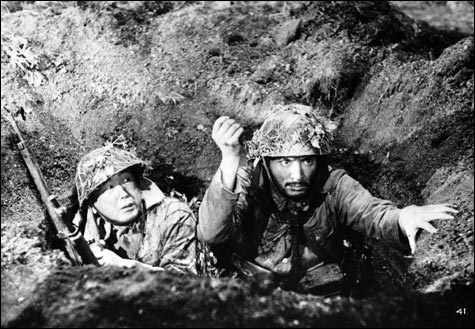
ANTI-WAR CLASSIC: Kobayashi’s six grueling years in the Army likely fueled the intense realism of the battle sequences |
| The Human Condition [Ningen No Joken] | Directed by Masaki Kobayashi | Written by Masaki Kobayashi + Zenzo Matsuyama based on the novel by Jumpei Gomikawa | with Tatsuya Nakadai, Minoru Chiaki, So Yamamura, Michiyo Aratama and Chishu Ryu. | Brandon Films, Inc. | Japanese | 587 minutes |
Japanese director Masaki Kobayashi (1916-1996) always stood up to the established order — the unjust, cancerous Samurai traditions that spread through Harakiri (1962), for example. More than almost anyone else working in postwar Japanese cinema (Nagisa Oshima also comes to mind), he fearlessly took aim at organized authority. Never was this more fully realized than in his epic antiwar trilogy, The Human Condition (filmed from 1959 to 1961), screening at the Museum of Fine Arts. (Those with hardened movie-going posteriors can view the entire trilogy — all 9 hours and 47 minutes of it — over the course of one very long day, beginning at 10:30 am on the 27th.)Brand new 35mm prints have been struck by Janus Films, so expect cinematographer Yoshio Miyajima's black-and-white widescreen "Grandscope" compositions to impress like they never could on the nearly unwatchable VHS editions that have been just about the only way to see the films until now. (My DVD screener copies appeared to be mastered from these very tapes, so feel free to say "hi" to me at the Museum on Saturday.)

Like Fires on the Plain, Kon Ichikawa's grisly antiwar masterpiece, Kobayashi's overwhelming, poetic epic based on the novel by Jumpei Gomikawa takes place in Manchuria. Part I, "No Greater Love," begins in 1943. Twenty-eight-year-old pacifist Kaji (an affecting early performance by Tatsuya Nakadai, star of Harakiri) takes on a job as manager of a mining camp in order to avoid conscription and remain with his beloved wife, Michiko (Michiyo Aratama). His efforts at reforming the inhumane working conditions are hindered by the Kempetai (military police), who force him to use Chinese POWs as slave labor. A climactic confrontation with the prisoners results in Kaji being relieved of duty and drafted for military service.
Part II, "The Road to Eternity," opens as the hardened young idealist struggles with the harsh physical and mental realities of military life. Kobayashi spent six grueling years in the Army himself, refusing promotions in protest of the war; his experiences likely fueled the intense realism on display, a pursuit all but abandoned by the time of his painterly anthology of ghostly tales, Kwaidan (1965). But here, verisimilitude serves him well, as Russian tanks roll in and a hopeless battle ensues.
Concluding in 1945, "A Soldier's Prayer" eventually finds a broken and starving Kaji rotting in a Russian POW camp, accepting that selling his soul for an Army exemption has led to him being among the "murderers who wear the mask of humanism."
After almost 10 sometimes preachy melodramatic hours, you'll have shared his ordeal, his inner monologues to his wife taking hold of your heart, crushing it as he stumbles across a snow-swept Siberian landscape, each footstep closer to fate, closer to an impossible reunion: "Michiko! It won't be long now. . . . "